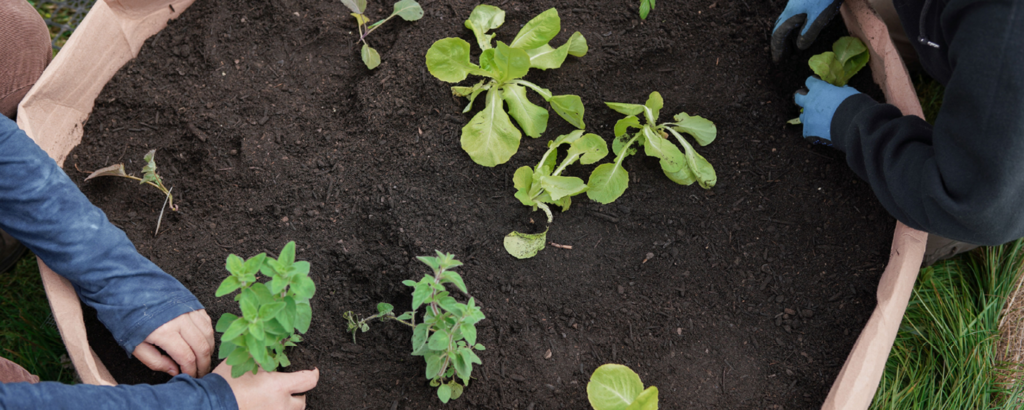Gardening is one of the most powerful tools for personal & societal change at our disposal.
by Tamara McFarland, Cooperation Humboldt

Food holds the power to heal or harm; to connect or divide; to restore or exploit. Every time we take a bite, we’re registering one tiny vote for the world we want to live in.
For many among us, decisions about what to feed ourselves and our families are outside of our independent control. If you live in a food desert, it’s tremendously difficult to gain regular access to nutritious foods. If you work three jobs to pay rent, you’re going to have a hard time finding time to cook from scratch. If you don’t have access to land, you’re facing a challenge to growing a garden.
To truly empower individuals and communities to meet their own needs, we must think – and work – both big and small.
Gardening – either at home or in a community setting – is one of the most powerful tools at your disposal. And as a bonus, it’s fun – and rewarding! Here are some of the reasons why growing one’s own food matters.
Save Money
If you’re careful about how you approach it, gardening can save you a lot of money. There are also plenty of ways to waste money while gardening, and the information in this magazine (as well as in our free Garden Guide) is intended to prevent that.
Produce can be pricey, especially fruits and veggies that are grown organically. By growing some of your own, you can enjoy high quality foods in season for just pennies on the dollar. The health benefits of a diet rich in organic fruits and vegetables can also reduce your medical expenses by promoting good health.
Improve Your Health
Regular consumption of fresh fruits and vegetables is one of the best ways to fight disease and maintain positive health. By bringing more of these foods into your diet, your garden empowers your family to live longer, healthier lives with less reliance on medical interventions.
Time spent outdoors engaged in gentle exercise like gardening is good for both your physical and mental health. Studies have shown gardening to reduce stress and improve mood, with a reduction in symptoms of depression and anxiety.
Become Better Prepared for Disasters
Disasters come in many forms, from earthquakes to the loss of a job. No matter what shock you encounter, you’ll be better prepared if you’re growing some of your own food.
We are isolated behind the Redwood Curtain, and our ability to connect with (or rely on) the outside world can change quickly due to earthquakes, landslides, wildfires, and more. As we face long term climate crisis, these kinds of disruptive events are forecast to become more frequent, and we are well served to become better prepared, both at the individual and community level.
Help the Planet
Growing food close to home has a number of benefits for our natural world.
By refraining from using harmful chemicals, you protect yourself and all your helpers, including humans, birds, bees, and butterflies from the toxic effects of pesticides.
Through responsible soil practices, you can improve your soil and sequester carbon.
By reducing – or ideally eliminating – your reliance on meats from factory farms, you help to protect the health of our watersheds by preventing toxic runoff that is an inevitable byproduct of large-scale conventional animal farming.
Food grown close to home helps prevent global warming because it requires less fossil fuels to transport, generating fewer greenhouse gas emissions.
And since the produce you harvest at (or near) home requires no plastic packaging, you’re keeping our oceans cleaner and our landfills less impacted.
Support Wildlife
Wildlife thrive in gardens of all kinds, particularly when fruit trees and vegetable plots are planted at the edges of undeveloped rural areas because bees and other pollinators enjoy supportive habitat that protects them from the pesticides used in industrial orchards and monocropping.
Large well-planned gardens with appropriate sun exposure are best for producing nectar and pollen; however, any effort at planting individual home and community gardens provides necessary resources and reproductive shelter for adult insects.
Deepen Human Connections
Most gardeners find that their hobby nurtures human connection.
Gardening provides an opportunity for those with children to engage in a wholesome (non-screen-based) joint activity that grows skills and builds relationships.
Beyond your own household, gardening is likely to connect you with neighbors, friends, and family as you share your harvest, swap seeds, and turn to one another for advice. You’re likely to make new friends as you plug into our wonderful local community of gardeners.
Cultivate Food Sovereignty
Gardening moves us closer to a world where everyone has what they need, and no one goes without.
It reduces our reliance on large corporations, supports our regional economy, strengthens local networks, and builds a growing cadre of residents who possess the skills needed to care for one another in good times and bad.
A community-scale shift to a local food system will not only benefit the natural world tremendously; it will also improve our individual health and our communal wellbeing as we learn to rely on one another and to collectively grow the skills we need to thrive.